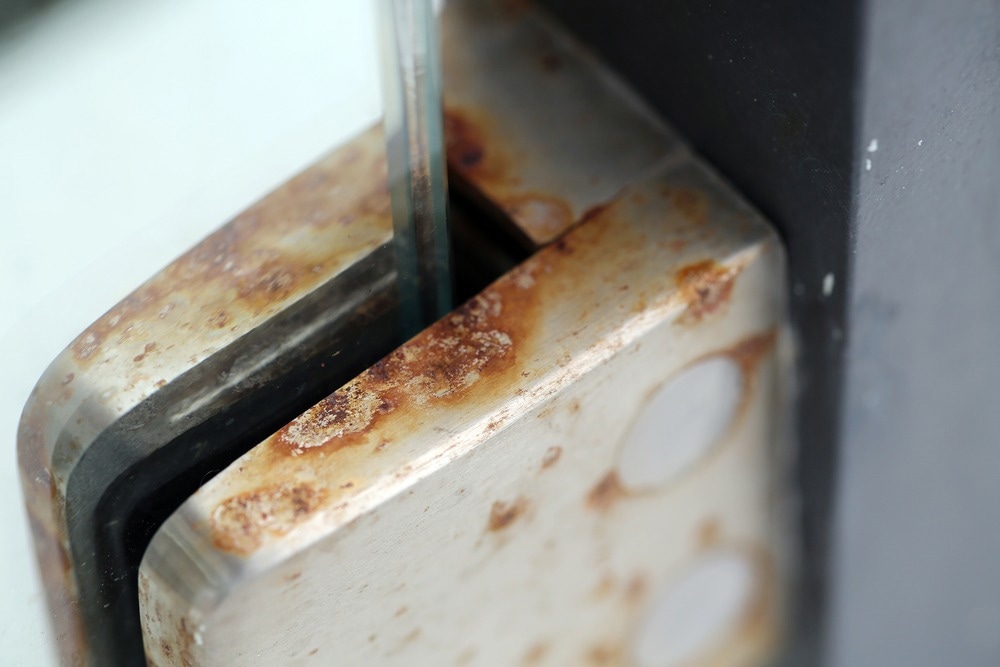Corrosion is a common issue faced by most metals and is caused by moisture reaching its surface. Coatings prevent corrosion, with epoxy coatings being one of the most widely used. Still, these coatings are not perfect.

Study: Improvement of anti-corrosion performance of an epoxy coating using hybrid UiO-66-NH2/carbon nanotubes nanocomposite Image Credit: Thomas Barrat/Shutterstock.com
To tackle this problem, a study published in the journal Scientific Reports presents an effective technique to enhance the anti-corrosion efficacy of epoxy-based coatings using the help of anti-corrosion nanocomposites.
Epoxy Resins – Making Metals Water Resistant
As promising substances, polymer-based coatings operate as a barrier that prevents water particles from accessing the surface of metals. Epoxy resin, a distinct category of polymer-based coatings, has exceptional qualities such as high moisture resistance, remarkable solvent resistance, combined with strong mechanical and thermal capabilities, and exceptional adhesion properties.
This substance has been used in many sectors, including aircraft production, automobile manufacturing, and petroleum extraction. However, issues like inefficient crack deflection efficiency and fragility limit further use.
It has been identified that the inclusion of nanosized additives into the composition of these epoxy coatings might increase their protective capabilities and overcome the associated frailties.
Are Nanocomposites the Solution?
Several studies have focused on the development of enhanced-quality nanomaterials with superior properties. A broad range of nanosized fillers, such as carbon nanotubes (CNTs), have been explored to improve the protective nature of epoxy-based coatings.
In the past few decades, a class of permeable materials having a three-dimensional structure has been extensively researched and produced.
Focusing on Metal-Organic Frameworks
Metal-organic frameworks (MOFs) have piqued the interest of numerous researchers since their introduction as substances with nanosized pore structures, adjustable characteristics, and astoundingly high surface areas.
Furthermore, these MOFs have been considered interesting options for developing corrosion-prevention coatings with high barrier capabilities. Unfortunately, very few studies describing the use of MOFs to create corrosion prevention coatings have been carried out.
Say Hello to Zircronium
Several studies have introduced bare MOFs with anti-corrosion abilities without requiring any changes. MOFs are very porous and practical for a wide range of uses. Yet, a deep and thorough understanding of mechanical characteristics associated with MOFs has not been fully understood.
Recent research has focused on zirconium-based (Zr) MOFs owing to the significantly high elastic modulus. The Zr MOFs profit from remarkable mechanical properties and a stable, compact structure when subjected to shear stress due to the precise coordination of both organic and inorganic components.
Carbon Nanotubes - A New Direction
Researchers have developed novel CNT-based coatings termed superhydrophobic coatings (SHCs) to prevent metals from corrosion.
It is important to consider that the restricted associations between polymer chains and CNTs employed in the epoxy architecture and the poor distribution of CNTs in the epoxy coatings are difficult to overcome. As a result, it is critical to managing the tangling of CNTs and their uniform distribution in the coating.
Given these issues, composites premised on combining CNTs and UiO-66-NH2 may offer much better anti-corrosion capabilities.
Basis of the Current Study
To solve the cited void in existing literature, the researchers created an UiO-66-NH2/CNTs-based anti-corrosion nanocomposite that allows the coating to operate as an effective protective layer. To achieve these objectives, a Zr-based MOF was used.
The characteristics of the generated MOFs/CNTs were examined with electrochemical impedance spectroscopy tests, contact angle, and salt spray measurements performed on the CNTs, UiO-66-NH2, and UiO-66-NH2/CNTs-based epoxy composites to evaluate their corrosion prevention ability.
Results of the Study
A major solution for building an enhanced protective coating is the creation of an anti-corrosion nanocomposite with a homogeneous structure and hydrophobic behavior. As a result, the team created an epoxy coating using UiO-66-NH2/CNT anti-corrosion nanocomposites.
The results demonstrated that after extensive treatments in NaCl aqueous solution, the UiO-66-NH2/CNT anti-corrosion nanocomposite-based epoxy coating revealed significantly improved coating performance.
The team pointed out that measurements of the contact angle showed UiO-66-NH2/CNT anti-corrosion nanocomposites improved the coating's hydrophobicity compared to UiO-66-NH2/epoxy-based and CNTs/epoxy-based coatings.
The team noted that the decreased corrosion damage region and visual performance surrounding the scribe region after salt spray treatment demonstrated the introduction of UiO-66-NH2/CNT anti-corrosion nanocomposites to the coating successfully boosted its corrosion qualities.
In the end, the key mechanisms for enhanced corrosion protection behavior of the coating are decreased hydrophilicity and greater additive homogeneity, resulting in improved barrier performance.
Reference
Abdi, J., Izadi, M., & Bozorg, M. (2022). Improvement of anti-corrosion performance of an epoxy coating using hybrid UiO-66-NH2/carbon nanotubes nanocomposite. Scientific Reports, Available at: https://www.nature.com/articles/s41598-022-14854-y
Disclaimer: The views expressed here are those of the author expressed in their private capacity and do not necessarily represent the views of AZoM.com Limited T/A AZoNetwork the owner and operator of this website. This disclaimer forms part of the Terms and conditions of use of this website.